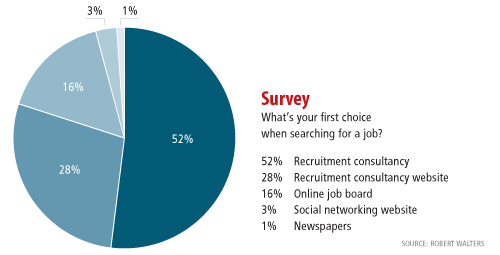Relationships still essential online and offline
Although social networks such as Facebook and LinkedIn now boast over 600 million users combined, while micro-blogging services such as Twitter offer a similarly large audience, it is not these numbers that have caught the attention of the recruitment industry. What has really made professionals take notice has been social media’s ability to engage audiences and to establish those essential business relationships that are a hallmark of business in Japan. With the large pool of skilled talent, social media have become increasingly essential tools among businesses, but what role should these media play in the recruitment process?
According to a recent survey by Robert Walters, only 3% of biculturally competent professionals in Japan relied first on social media for their job search, while over 81% of survey respondents said they primarily relied on recruitment firms and their job boards. With this level of reliance on consultancies among workers in Japan, social media recruitment—as a database tool—is still in its infancy and is seen by many as being primarily a communication tool.
For employers, a key advantage of social networks is that they provide a direct communication channel to potential employees. This can be very advantageous for HR departments with limited resources, as it allows firms to access passive potential candidates—those who may not yet wish to make a change. As most recruitment professionals will tell you, knowing what skill sets exist in the talent pool is essential, but knowing what skill sets are potentially available is equally important.
 With more of our information finding its way online, LinkedIn and other professional networks have allowed hiring managers to further screen prospective candidates and their skill sets. Social networks have made it possible to research potential employees and their work history much more quickly and easily than in the past. While this has led to an increase in targeted approaches, relying solely on social networks for personal details can be dangerous and, in some cases, unethical. At best, information online can be out of date and thus not reliable. In addition, many users are still hesitant to provide sensitive employment information online.
With more of our information finding its way online, LinkedIn and other professional networks have allowed hiring managers to further screen prospective candidates and their skill sets. Social networks have made it possible to research potential employees and their work history much more quickly and easily than in the past. While this has led to an increase in targeted approaches, relying solely on social networks for personal details can be dangerous and, in some cases, unethical. At best, information online can be out of date and thus not reliable. In addition, many users are still hesitant to provide sensitive employment information online.
While social media are becoming increasingly prominent as recruitment tools, many industry professionals do not expect online networks to replace such traditional screening techniques as interviews and reference checks but, rather, to be complementary standard industry procedures among recruiters.




